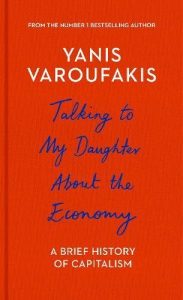 Richard Peers offers a thoughtful review of Talking to My Daughter About the Economy, Yanis Varoufakis, Bodley Head 2017 (2013):
Richard Peers offers a thoughtful review of Talking to My Daughter About the Economy, Yanis Varoufakis, Bodley Head 2017 (2013):
There is competition for the title ‘Queen of The Sciences’. Traditionally applied to theology as the summit of knowledge and the science which explained the meaning of things and held together the other areas of knowledge, the title was also claimed, in the nineteenth century, for mathematics.
Perhaps, in our own time the title could be claimed for economics? Economic models are applied to our schools, our hospitals, our public services. Economics, we might be led to believe, can explain the narrative of human history.
When I taught GCSE Economics I struggled with recommended reading for my pupils. There were text books to choose from, needed to ensure curriculum coverage, but they were, it felt to me, full of isolated pieces of knowledge that it was difficult to locate into context or a larger framework or narrative. For the first half of Yanis Varoufakis’s book Talking to My Daughter About the Economy I thought that it was the book I had been searching for. A sweeping narrative of economic history, explaining markets, capital and labour in a historical context and with simple non technical language. It is, indeed, the book I needed for my pupils, but it is so much more than the one I had imagined. The former Greek Finance Minister and erstwhile politician shows how, far from being a science in our current understanding of the word, economics is a philosophy, a language for talking about the world but not identical with it. As he writes near the end of the book:
We face a choice: we can keep pretending we are scientists, like astrologists do, or admit that we are more like philosophers, who will never know the meaning of life for sure, no matter how wisely and rationally they argue.
Varoufakis wrote the book for his teenage daughter in just nine days in 2013 before his brief tenure in government, but all the key themes of that period are present. He begins with a sweeping history of the creation of currency (which he places earlier than is usually accepted), debt, and what he calls the ‘market society’ rather than capitalism. His starting point, refreshingly, is the origin of the inequalities of the world. I had not come across the idea that Eurasia was the seat of the industrial revolution mainly because of geography and the east-west axis of the continent, ensuring easy trade and transfer of goods in similar weather conditions.
Varoufakis must be a great teacher. He uses easily understandable examples and colourful cultural references. The book includes Star Trek and The Matrix as major examples of markets grabbing the future. He references Greek myths and Second World War prisoner of war camps. Mary Shelley and her Frankenstein gets a star role. Marvellously he ends by quoting our own Anglican, T.S.Eliot. There is an element of romp to the book that might be explained by the nine days of writing or just Varoufakis’ motorbike-riding character. Either way it is deeply attractive. As he himself says, “those who write well about the economy borrow their best ideas from artists, novelists, scientists.”
From a Christian perspective the book is particularly interesting. Varoufakis is no fan of the church, and the clergy in particular, who he interprets as simply giving the necessary status to the forces of the market “Debt, money, faith and state all go hand in hand.” It would be hard to suggest that Christian, and other religious leaders, have not at times, and sometimes for long periods of time behaved in this way “cultivating an ideology which caused the majority to believe deep in their hearts that only their rulers had the right to rule”. But there is much in the book that is much more interesting from a religious, theological point of view than this. Varoufakis is concerned with the commodification of life and of human persons, with the re-creation of experiential value. He is clear that commodities will be ultimately unsatisfactory and that some greater measure of happiness is needed. At times he reads like a Rousseau-esque romantic in his view of human nature. Stating his fundamental belief “that humans have an inexhaustible ability to resist the erosion of their spirit and the cheapening of their labour.” He is certainly full of hope, although it is hard not to speculate, following his departure from government and the refusal of the EU to write off Greek debt; if he still believes that “Every crisis is pregnant with a recovery.”
For me the sterility of our politics which is the hegemony of the market and the lack of any alternatives is at the heart of what I want from economics. Varoufakis fails to deliver on that, which would make him close to messianic. But he does suggest alternatives to the mere binary arguments between big-government and small-government. He is clear about the necessity of public debt, and perhaps there is mileage in acknowledging that, and having a sensible discussion about what a manageable level of debt is and owning the fact that taxes, whether from the rich or the rest of the population are not going to be able to pay for everything we want government to provide.
When you hear politicians, economists, and commentators talk about public debt as if it is a curse, you remind yourself that it is a lot more than that. It is the ghost in the machinery of markets societies that makes them function …
Varoufakis’ hope for the future includes his beliefs in the development of robotic automatisation. This, for me, is the least convincing part of the book. What will and will not be possible for machines is still not known. Too many of his examples of what might be possible derive from science-fiction not reality. The suggestion that there be public ownership of some proportion of machine-robots as they develop feels just plucked from thin air.
 For Varoufakis “the economy is too important to leave to the economists.” To defer to ‘experts’ is to capitulate political freedom. This is an important read and Varoufakis has much to contribute to the debate. It is a much better book than his self-justifying and self-aggrandising Adults in the Room. He is clear that economics and politics can never be separated. We need to hear alternative voices in this debate and Varoufakis is a rare voice. Over and over again, I was struck by the existential nature of the questions he raises: What is it to be human? What is satisfaction? How do we achieve happiness? For me, of course, these are all theological questions. It is not surprising that he ends with Eliot: the end of all our exploring will certainly be to arrive where we started.
For Varoufakis “the economy is too important to leave to the economists.” To defer to ‘experts’ is to capitulate political freedom. This is an important read and Varoufakis has much to contribute to the debate. It is a much better book than his self-justifying and self-aggrandising Adults in the Room. He is clear that economics and politics can never be separated. We need to hear alternative voices in this debate and Varoufakis is a rare voice. Over and over again, I was struck by the existential nature of the questions he raises: What is it to be human? What is satisfaction? How do we achieve happiness? For me, of course, these are all theological questions. It is not surprising that he ends with Eliot: the end of all our exploring will certainly be to arrive where we started.
Father Richard Peers is Director of Education in the Diocese of Liverpool, and tweets (often!) at @educationpriest and blogs at Quodcumque
Follow me on Twitter @psephizo. Like my page on Facebook.
Much of my work is done on a freelance basis. If you have valued this post, would you consider donating £1.20 a month to support the production of this blog?




























Great piece Ian. 🙂
The idolization of the market’s the curse of our times. Instead of the economy serving the people, we’re told that we must serve the hideous tin-god of our own creation. Neoliberal claims have so permeated society they’ve become dogma. Even so-called progressives accept, say, the inevitability of off-shoring as unquestionable truth. When I try and address this with millennials, it’s so far outside their paradigm they won’t even engage, preferring the safe ground of identity politics (which suits latter-day robber barons nicely).
Of course economics isn’t a science: science seeks to understand the world as it is; economics is a human construct, one that we can, and must, shape to our own purposes. The mega-rich understand this, which is why they’re swimming in a sea of gold that’d drown Scrooge McDuck. We need to wise up before we go under too.
Hi Richard.
My first thought is that Greece is not where I’d go for advice on economics and debt!
Can you clarify what this other source of government income is besides taxes? Is he advocating government ownership of profit making industry?
You refer to the necessity of public debt. The real issue though is structural deficit. Can you say a little more about that?
My own thoughts on this are here: https://faith-and-politics.com/2017/07/16/the-christian-case-for-austerity/